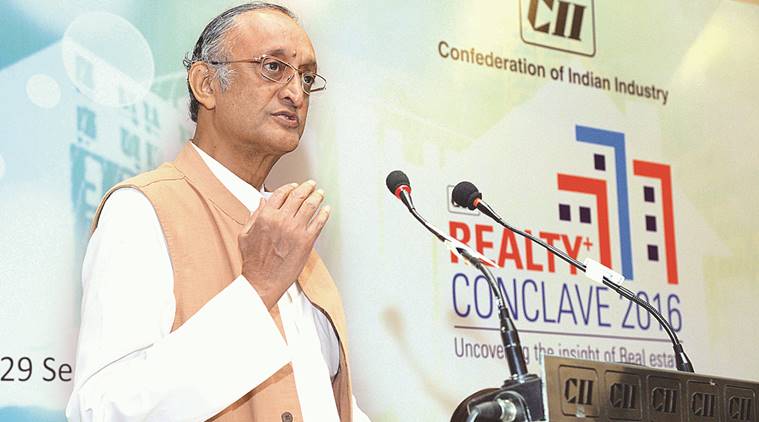GST revenue gap may widen to Rs 85,000 crore for FY18: Amit Mitra
Criticising the premature roll-out of GST, Mitra pointed to the inability of small and medium enterprises (SMEs) to file returns under GST.
 Amit Mitra, in Kolkata. (Express File Photo)
Amit Mitra, in Kolkata. (Express File Photo)
Expressing concern over declining goods and services tax (GST) revenue, West Bengal’s finance minister Amit Mitra on Thursday said that states are facing a revenue shortfall of Rs 39,111 crore in the four months after the July 1 roll-out. The government had anticipated a revenue shortfall of Rs 55,000 crore, which was expected to be recovered through the compensation cess levied on luxury and sin goods, but now the revenue gap is expected to widen to Rs 80-85,000 crore for the whole financial year, Mitra said.
“Revenue of Rs 43,013 crore per month was to be protected for states. For all states for four months, we needed Rs 1.72 lakh crore for revenue protection. What have we got? Rs 1.33 lakh crore. That means there is a revenue protection shortfall of Rs 39,111 crore in the (first) four months,” Mitra said at the annual general meeting of Ficci here .
Mitra was participating in a session on GST with Jammu & Kashmir finance minister Haseeb Drabu and Bihar finance minister Sushil Kumar Modi.
Criticising the premature roll-out of GST, Mitra pointed to the inability of small and medium enterprises (SMEs) to file returns under GST.
Drabu said that the “traditional supply chain networks” have been broken and there is a need to repair them. He said that the composition scheme needs to be tweaked to allow availment of input tax credit (ITC) so that big companies buy from SMEs.
In a separate session, finance minister Arun Jaitley said that the direct tax is levied at 5 per cent at entry level and the annual turnover threshold for composition scheme under GST is Rs 1.5 crore, so it’s not supposed to hurt SMEs.
“A study of the first 4-5 months as far as GST is concerned reveals something extremely interesting. Of all the people who registered for GST, 95 per cent of the tax comes from 400,000 people and these 400,000 are paying irrespective of the procedures etc. Of the others, the total body pays nil, negligible or very little and therefore the tax liability itself is hurting that section, the tax payments don’t seem to indicate that. Don’t be surprised if I tell you that 35 per cent of the returns that we are getting under the GST, the tax paid is nil,” Jaitley said.
Jaitley added that when GST collections improve, they will start rationalising. He added that invoice matching and e-way bill are going to ensure that tax evasion is more difficult going forward.
Drabu highlighted the need to undo two decisions – removal of reverse charge mechanism (RCM) and deferment of e-way bill. “We need to bring it (RCM) back as soon as possible. That may also be the way forward for repairing the supply chain networks because small guys supply to big guys, who will be charged RCM, the supply changes would be restored…we need to bring back e-way bill from January 1 and that should address a number of concerns that are emanating in states,” he said.
Drabu, however, said that states have got a “wonderful deal” with a virtual tax insurance policy as they are guaranteed compensation for next five years if they fall below the 14 per cent growth rate fixed over the base year of 2015-16. He also proposed that there is a need to do away with MRP (maximum retail price) under GST. “MRP and GST don’t go together. We need to now abolish MRP to allow market forces and differently priced goods to arrive at the prices,” he said.
Sushil Modi also supported that view, saying that invoices in B2C transactions should not reflect detailed tax break-up. He said that going ahead, the GST rates will be rationalised further to 3-4 slabs and efforts will be made to bring electricity, real estate, stamp duty and petroleum under the GST ambit.




- 01
- 02
- 03
- 04
- 05



























